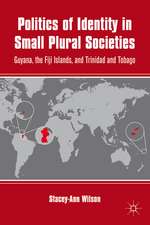Political Change in Post-Communist Slovakia and Croatia: From Nationalist to Europeanist
Autor S. Fisheren Limba Engleză Hardback – 23 oct 2006
| Toate formatele și edițiile | Preț | Express |
|---|---|---|
| Paperback (1) | 386.22 lei 6-8 săpt. | |
| Palgrave Macmillan US – 23 oct 2006 | 386.22 lei 6-8 săpt. | |
| Hardback (1) | 388.13 lei 6-8 săpt. | |
| Palgrave Macmillan US – 23 oct 2006 | 388.13 lei 6-8 săpt. |
Preț: 388.13 lei
Nou
Puncte Express: 582
Preț estimativ în valută:
74.27€ • 80.93$ • 62.58£
74.27€ • 80.93$ • 62.58£
Carte tipărită la comandă
Livrare economică 24 aprilie-08 mai
Preluare comenzi: 021 569.72.76
Specificații
ISBN-13: 9781403972866
ISBN-10: 1403972869
Pagini: 304
Ilustrații: X, 263 p.
Dimensiuni: 140 x 216 x 19 mm
Greutate: 0.42 kg
Ediția:2006
Editura: Palgrave Macmillan US
Colecția Palgrave Macmillan
Locul publicării:New York, United States
ISBN-10: 1403972869
Pagini: 304
Ilustrații: X, 263 p.
Dimensiuni: 140 x 216 x 19 mm
Greutate: 0.42 kg
Ediția:2006
Editura: Palgrave Macmillan US
Colecția Palgrave Macmillan
Locul publicării:New York, United States
Cuprins
PART I: THE RISE OF NATIONAL MOVEMENTS AND THE POLITICAL MOBILIZATION OF POPULATIONS The Discursive Battle Between Nationalists and Europeanists The Rise of Nationalist Regimes: 1990 in Croatia and 1992 in Slovakia PART II: MAINTAINING NATIONAL MOBILIZATION Structuring the Ideology of the New State Economic Policies: Using State Property for Political Gain The Politics of Culture: Promoting a National Identity PART III: THE DECLINE OF NATIONAL MOVEMENTS The Growth of Democratic Civil Society and Emergence of Alternative Identities The Fall of National Movements: 1998 in Slovakia and 2000 in Croatia PART IV: MOVING TOWARD EUROPE The Role of Europeanists Conclusion
Recenzii
"Sharon Fisher captures the essence of the revolutionary transformation in two newly independent Central European states. Both Slovakia and Croatia overcame weighty political obstacles during their progress from communist federal units to democratic sovereign states. Their challenges and successes in entering the pan-European fold can serve as examples to all remaining post-communist countries struggling with divisive nationalism and stifling authoritarianism."
- Janusz Bugajski, Center for Strategic and International Studies
"This volume contributes to understanding several intertwined aspects of post-communist developments in East Europe. Disdaining stereotypes, Fisher explores in depth the instrumental nationalism of the ruling elites of these two states and the political culture of the populations that, for a time, supported them. A dynamic analysis, this work explores both how nationalists came to power and how they lost it. Throughout, Fisher utilizes an effective comparative focus and shows a keen assessment of the relative power of domestic and international factors. This is a comprehensive, first-rate study."
- Ronald H. Linden, Professor of Political Science, University of Pittsburgh
"This is a clear and illuminating comparative study of two 'laggards' of the democratic transition who eventually overcame the temptation of authoritarian nationalism. Through a remarkable analysis of Slovakia and Croatia, Sharon Fisher makes a point of broader significance, suggesting that the dilemma between 'Nationalists' and 'Europeanists' represented two phases (two faces) of the post-communist change in much of East-Central Europe." - Jacques Rupnik, Fondation Nationale des Sciences Politiques, Paris
- Janusz Bugajski, Center for Strategic and International Studies
"This volume contributes to understanding several intertwined aspects of post-communist developments in East Europe. Disdaining stereotypes, Fisher explores in depth the instrumental nationalism of the ruling elites of these two states and the political culture of the populations that, for a time, supported them. A dynamic analysis, this work explores both how nationalists came to power and how they lost it. Throughout, Fisher utilizes an effective comparative focus and shows a keen assessment of the relative power of domestic and international factors. This is a comprehensive, first-rate study."
- Ronald H. Linden, Professor of Political Science, University of Pittsburgh
"This is a clear and illuminating comparative study of two 'laggards' of the democratic transition who eventually overcame the temptation of authoritarian nationalism. Through a remarkable analysis of Slovakia and Croatia, Sharon Fisher makes a point of broader significance, suggesting that the dilemma between 'Nationalists' and 'Europeanists' represented two phases (two faces) of the post-communist change in much of East-Central Europe." - Jacques Rupnik, Fondation Nationale des Sciences Politiques, Paris
Notă biografică
SHARON FISHER is Senior Economist at Global Insight in Washington DC, USA.














